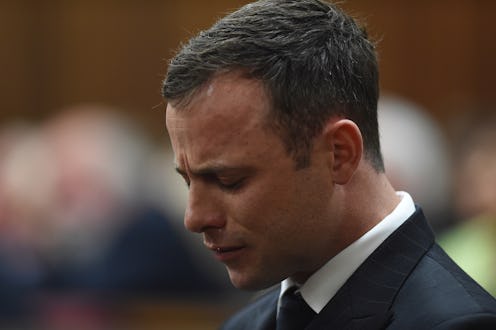News
Will Pistorius Be Convicted Of Murder After All?
Oscar Pistorius’ lawyers have tried and failed to block an appeal by South African state prosecutors against the double-amputee athlete’s negligent killing conviction. The prosecutors hope to have Pistorius found guilty of murder for the killing of his girlfriend Reeva Steenkamp in February 2013. After a hearing Friday at the Johannesburg High Court, Judge Thokozile Masipa — who ruled on the well-publicized trial last year — dismissed the defense lawyers’ appeal.
Late on Valentine’s Day 2013, Pistorius — 28-year old Paralympian and South Africa’s sweetheart — fired several bullets through a toilet door in his apartment in Johannesburg. Steenkamp, a 29-year old law graduate, former model, and Oscar's then-girlfriend, was on the other side of the door. She was struck by three of the bullets and died at the scene.
Last September, after a seven-month trial that captivated the nation and the world, Pistorius was cleared of murder and sentenced to five years in jail on the lesser charge of culpable homicide. At the time, Masipa gave prosecutors permission to challenge her ruling on matters of law, by taking the case to South Africa’s Supreme Court of Appeal. Pistorius’ barrister Barry Roux argued this morning that the judge should not have permitted the appeal, on the grounds that the prosecutors hoped to appeal “matters of fact rather than law,” according to The Daily Mail.
Roux’s argument was deemed invalid, and Pistorius’ murder acquittal is now open to appeal. “In my view, to entertain this application will be tantamount to reviewing my own decision,” BBC quotes Masipa as saying post-hearing. “For one thing there is really nothing new in the submissions by counsel for the applicant.”
The culmination of a massive media whirlwind, Masipa’s initial verdict provoked controversy, both because it did not align with the emotional current of the South African public, and because — more interestingly — the judgment of culpable homicide was determined by a particular, and arguably problematic, interpretation of the law.
Masipa’s decision to acquit Pistorius of murder rested on her interpretation of dolus eventualis — a “common murder” charge, which requires that the accused foresaw the possibility that his actions might result in the death of a person, and went on to complete those actions regardless. Pistorius argued in court that he had shot Steenkamp accidentally, mistaking her for a burglar. In Masipa’s interpretation of dolus eventualis, Pistorius’s foresight was therefore not sufficient to convict him of murder: he knew he might kill someone, but he did not suspect that that someone might be Reeva.
As BBC reports, prosecutor Gerrie Nel believes this was a misinterpretation of the principles of dolus eventualis. Nel hopes to secure a murder conviction and a longer sentence — perhaps on the grounds that the accused’s foresight of the exact identity of the victim of his/her action is irrelevant to the intention component of the fault. In other words, dolus should be determined according to the level of foresight that corresponds to the criminal prohibition: if murder is wrong in general, then a murder sentence should not be dependent on whether you know exactly who will end up dead as a result of your actions.
"I would say that the law is clear," South African barrister Ulrich Roux wrote regarding dolus eventualis in The Guardian after the initial judgement, "it doesn't have to be a specific person whose death can be foreseen, it can be anyone." However, as The Independent points out, this legal argument is complicated by the fact that Pistorius was initially on trial specifically for the murder of Steenkamp.
Pistorius is currently serving his time at Kgosi Mampuru II prison in Pretoria, and did not attend the latest hearing. No members of his or Steenkamp’s family were present, according to The New York Times. June Steenkamp, mother of the deceased, said she had no interest in the appeal. “How is it going to help me?” she asked at a press conference earlier this week. “My daughter died. Horribly.”
Pistorius could be transferred from jail to house arrest after serving ten months of his five-year sentence, ie. in August 2014 at the earliest. As The Guardian points out, this means that the athlete could possibly be out of prison by the time the appeal hearing takes place. If the appeal succeeds and Pistorius is convicted of murder, he will face a minimum 15 year sentence.
Meanwhile, he appears to be filling his days productively.
Images: Getty Images (4)
